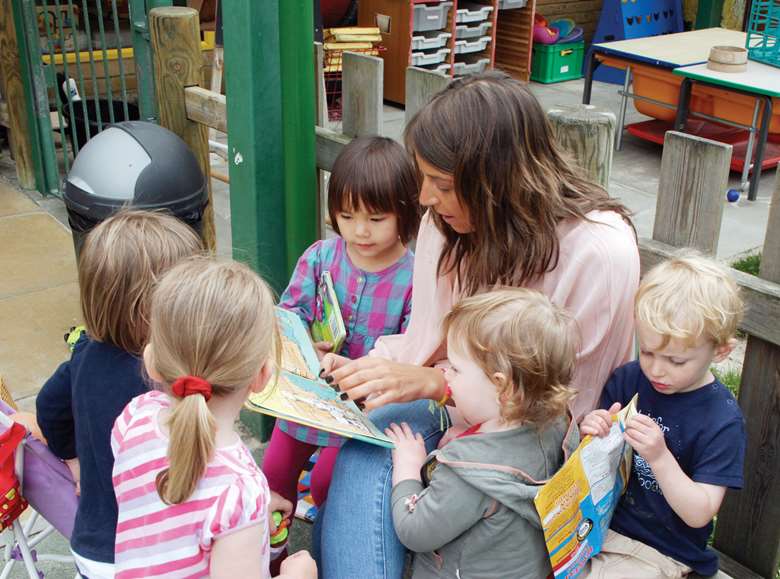MPs demand early intervention drive and children's centres action
Gabriella Jozwiak
Wednesday, November 14, 2018
The government should undertake a "fundamental shift" on early intervention policy by setting out a national strategy to tackle childhood adversity and trauma, and outline its plans for the future of children's centres, an influential group of MPs has said.

A report published by the science and technology select committee calls on the government to provide more funding to local authorities as part of a coherent approach on early intervention, on the grounds that it saves money in the long term.
They have also called for the government to invest more money in the Early Intervention Foundation (EIF), to act as a specialist, central support team to help councils with planning, delivery and problem solving.
The recommendations echo calls made last week by the EIF, which said the government should create a 25-year early intervention plan to ensure services are better co-ordinated across the country.
Last year, analysis of government figures found that council spending on children's centres and early years support had fallen by nearly £700m since 2010.
The committee has urged the government to clarify its position on Sure Start children's centres and specify if and when it intends to hold a consultation on their future that was announced in 2015 but never carried out.
It said: "If a consultation is not going to be held, the government must urgently reinstate Ofsted inspections of children's centres and make clear its thinking on the role and value of children's centres."
The committee said government must improve its oversight of early intervention provision around the country, identifying approaches that work well, discovering which local authorities need support, and take steps to hold local authorities to account for provision.
It wants government to improve knowledge of early intervention among practitioners such as teachers, health visitors and police officers, by including it in training for such professions.
- Restructuring children's services on early intervention approach
- Analysis: Mapping children's centre cuts
The report also calls on the government to view spending on early intervention as an opportunity to save costs, as well as to improve people's lives, rather than a demand on resources.
It states: "Funding constraints should not be used by local commissioners and others as an excuse to avoid acting upon the latest evidence regarding childhood adversity and early intervention - especially given the savings that some programmes can deliver for local authorities, particularly in the long-term, and given the positive impact on the life chances of children."
Liberal Democrat MP Norman Lamb, who chairs the committee, said the UK government should follow the example of the Scottish and Welsh governments, which have "made using early intervention to address childhood adversity and trauma a priority".
"Adversity in childhood appears to be the biggest single risk factor in the emergence of mental ill-health in childhood and teenage years, and beyond," he said.
"If we are to make any impact on the high prevalence of mental ill-health in childhood, we have to transform how we address the causes.
"During our inquiry, we have seen examples of good practice being delivered around the country, but a national strategy with co-ordinated support for local authorities could see the transformative benefits of early intervention offered to all children who need it, irrespective of where they live."
The committee's recommendation for the government to increase and extend the EIF would involve it identifying local authorities that would become "early intervention places" and receive particular support.
This model would be akin to the work the charity Education Endowment Foundation has done for schools, including funding and co-ordinating interventions in schools and building an evidence base of what works.
EIF chief executive Jo Casebourne said the report's proposals had "the potential to bring about a step-change for early intervention in England".
"We endorse the committee's call for a national strategy for early intervention, and look forward to further discussions with departments and agencies across Whitehall to make this ambition a reality," she said.
"The committee has underlined the role of the EIF as a key partner with central and local government in developing and implementing the national strategy.
"We stand ready to work with and support national and local partners across the country, and to continue developing our team, resources and expertise to meet the challenge that the committee has laid down."
In 2016, the EIF estimated the national cost of "late intervention" was £16.6bn, derived mostly from expenditure on children's social care, crime and anti-social behaviour and youth economic inactivity.
The EIF told the committee this estimated cost of late intervention "clearly represents a significant avoidable burden that could be better spent, and even modest reductions would equate to large savings".
Other recommendations in the report included that the government should address the shortage of health visitors, so that all children receive five visits coverage of the five health visits as mandated by the Healthy Child Programme.




